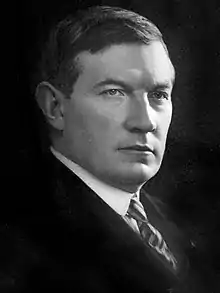Pádraic Ó Máille | |
|---|---|
 Ó Máille, c. 1922 | |
| Leas-Cheann Comhairle of Dáil Éireann | |
| In office 6 December 1922 – 23 May 1927 | |
| Ceann Comhairle | Michael Hayes |
| Preceded by | Brian O'Higgins |
| Succeeded by | James Dolan |
| Teachta Dála | |
| In office August 1923 – June 1927 | |
| In office May 1921 – June 1922 | |
| Constituency | Galway |
| In office December 1918 – May 1921 | |
| Constituency | Galway Connemara |
| Senator | |
| In office May 1934 – January 1946 | |
| Constituency | Nominated by the Taoiseach |
| Personal details | |
| Born | 23 February 1878 Kilmilkin, County Galway, Ireland |
| Died | 19 January 1946 (aged 67) |
| Military service | |
| Allegiance | Irish Republic |
| Branch/service | |
| Battles/wars | |
Pádraic Ó Máille (23 February 1878 – 19 January 1946) was an Irish politician. He was a founder member of Sinn Féin and of the Conradh na Gaeilge in Galway. He was a member of the Irish Volunteers from 1917 to 1921.
He was born in Kilmilkin, in Maam Valley in County Galway and was a farmer. He was elected as a Sinn Féin MP for Galway Connemara at the 1918 general election.[1]
In January 1919, Sinn Féin MPs who had been elected in the Westminster elections of 1918 refused to recognise the Parliament of the United Kingdom and instead assembled at the Mansion House in Dublin as a revolutionary parliament called Dáil Éireann.[2] He was re-elected as a Sinn Féin Teachta Dála (TD) for the Galway constituency at the 1921 elections.[3]
He supported the Anglo-Irish Treaty and voted in favour of it. He was re-elected as a pro-Treaty Sinn Féin TD for Galway at the 1922 general election, and was elected as a Cumann na nGaedheal TD for Galway at the 1923 general election. In the subsequent Irish Civil War, he was targeted for assassination by anti-Treaty forces and was shot and badly wounded in Dublin in December 1922.
He was critical of the proposed Irish Boundary Commission and resigned from Cumann na nGaedheal and founded a new political party called Clann Éireann in 1926.
He lost his seat at the June 1927 general election and was unsuccessful at the September 1927 general election. He later joined Fianna Fáil (the party which had emerged from the anti-Treaty side in the civil war) and contested the 1932 general election for that party in the Dublin County constituency but was not elected.[3]
On each of these occasions he was subjected to a smear campaign by his former party colleagues who used his pro-Treaty stance during the civil war against him. It was alleged that he had personally selected his fellow county man Liam Mellows for execution. These smears persisted despite denials from the Mellows family and from Ó Máille himself. In fact, Mellows was executed in reprisal for the attack on Ó Máille and Sean Hales in 1922. Mellows was shot the following day while Ó Máille himself was gravely wounded and in hospital.[3]
He served as a Fianna Fáil Senator in Seanad Éireann from 1934 to 1936. He was re-elected to the new Seanad in 1938 on the Agricultural Panel. From 1939 until his death in 1946 he was re-appointed to the Seanad as a nominee of the Taoiseach Éamon de Valera. He was Leas-Chathaoirleach (deputy chairperson) of the Seanad from May to November 1938.
 Prosecution of Patrick O´Malley MP; Firing Revolver At Police
Prosecution of Patrick O´Malley MP; Firing Revolver At Police.pdf.jpg.webp) British Army intelligence file for Patrick O'Malley
British Army intelligence file for Patrick O'Malley
Sources
- Richard Dunphy (1995), The Making of Fianna Fáil Power in Ireland: 1923–48
- Michael Ó Cuinneagáin (1996), On the Arm of Time
References
- ↑ "Pádraic Ó Máille". Oireachtas Members Database. Retrieved 11 April 2009.
- ↑ "Roll call of the first sitting of the First Dáil". Dáil Éireann Historical Debates (in Irish). 21 January 1919. Archived from the original on 19 November 2007. Retrieved 11 April 2009.
- 1 2 3 "Pádraic Ó Máille". ElectionsIreland.org. Retrieved 11 April 2009.